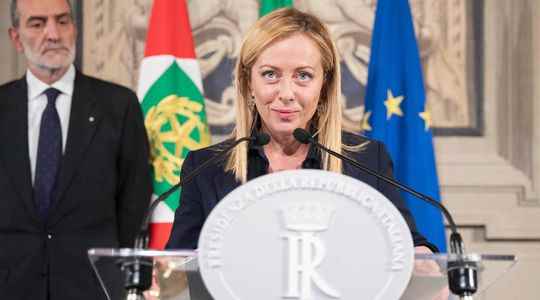Brussels extends its hand cautiously. The European Union, very circumspect about the rise to power of the extreme right in Italy, said she was ready to “cooperate” with the government of post-fascist Giorgia Meloni, who was sworn in on Saturday, October 22 and is due to take office on Sunday. This reaction comes after the presentation of his new government team, which reflects a dual desire: to reassure foreign partners while maintaining a very right-wing identity. “She does not keep her flag in her pocket,” notes Marc Lazar, professor emeritus of history and political sociology at Sciences Po and president of the Luiss-Guido Carli University in Rome. Maintenance.
L’Express: What is your analysis of this government whose objective, it seems, is to try to reassure the markets and Europeans?
Mark Lazar: First of all, it is the government of Giorgia Meloni. It imposed its conditions and its ministers on its allies, in particular the League (extreme right) and the conservative party Forza Italia. The government was formed fairly quickly and with the agreement of the President of the Republic, Sergio Mattarella. One thing is certain: the government has a double face. On the one hand the desire to reassure; on the other, it remains very to the right. A certain number of appointments aim to attract the financial markets, Italian business circles and European capitals. This is the case of the Minister of Economy, Giancarlo Giorgetti, and that of Foreign Affairs, Antonio Tajani.
On the other hand, the titles of certain ministries challenge…
Some of them – and the fact that the government is not very feminized – mark the very right-wing character of the government. For example, there is the Ministry of Agricultural Policies and Food Sovereignty, behind which we can see an attempt to mark a form of pre-eminence of the national dimension in agricultural issues. It is also interesting to look at the Ministry of Business and made in Italy: it is a very important brand that embodies an element of national pride, the red thread of Meloni. This may imply an attempt at protectionism. Finally, Eugenia Maria Roccella scooped the post of Minister of Family and Births, while she is anti-abortion. This choice can be interpreted as follows: to increase the birth rate, access to abortion must be reduced.
Economically, will Giorgia Meloni do “Draghi bis”?
Meloni’s priority is the economic and social situation in Italy. For the position of the Ministry of the Economy, she failed to find a technician, and it is not for lack of having proposed to several personalities who declined. She was forced to call on Giancarlo Giorgetti, a figure in the League. He was in the government of Mario Draghi (ex-Prime Minister) and should be in continuity. However, Giorgia Meloni has entrusted the Italian national recovery plan to one of her loyal followers at the Ministry of European Affairs, Raffaele Fitto. She could be tempted to negotiate the recovery plan with Brussels.
On the diplomatic level, the chosen ministers seem to align themselves with the line of Brussels, in particular on the war in Ukraine.
The Ministry of Defense was given to one of his relatives, Guido Crosetto. On the question of Ukraine, Giorgia Meloni will continue to be on the same line as Mario Draghi, that is to say in favor of maintaining sanctions and sending weapons to kyiv, two points on which Forza Italia and the League remain opposed. Just 24 hours ago, we heard Silvio Berlusconi say he was against Zelensky and pro-Putin, in a leaked recording. It’s hard to understand the impact these leaks will have. Antonio Tajani is considered close to Berlusconi, but he condemned his ally’s remarks in order to show that he retained his own autonomy. If he remains on the position of Giorgia Meloni, he will have to deal with this old caiman, who makes this type of declaration with the desire to weaken the Prime Minister.
Will the most complicated task for Meloni be to manage his allies?
The Prime Minister has several thorns in her side to leave. The essential question is the relationship between Fratelli d’Italia and its allies. Giorgia Meloni took away the management of the ports from Matteo Salvini, which she gave to one of her relatives, a way of humiliating him a little more. Not only does Meloni have a problem with her allies, but she also needs to know what relationship she wants to maintain with Europe, and what direction she intends to take. More generally, will it move towards an attempt at national withdrawal or respect the European framework?
Emmanuel Macron must go to Rome on Sunday and Monday. How to qualify relations between France and Italy?
Franco-Italian relations were excellent with Mario Draghi, a honeymooner. There was a lot of convergence between the two men on the issues of deficit and public debt, or on the need to conduct a common policy on the migration issue. Another very important thing, they had mutual respect.
p
With Meloni, it will be very different. In 2018, she violently attacked Emmanuel Macron and is now more discreet in relation to France. The Prime Minister may try to meet Emmanuel Macron when he is in Rome, where he is taking part in the opening of a forum on peace organized by the Catholic community Sant’Egidio. If Meloni asks to see Macron, and if he accepts, it will be a strong political gesture. This would mean that, despite their great political and ideological difference, there is a will to try to build something together. They could try to win a ceiling price for energy and make Germany bend on this point, or agree on the migration issue.
p
